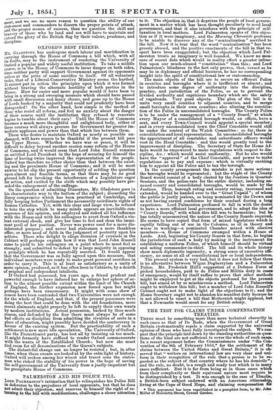PALMERSTON AND HIS POLICE PILL.
LORD Perinawrox's intimation that he relinquishes his Police Bill US deference to the prejudices of local opponents, but that he does not admit their objection, and reserves to himself the right of re- turiiiiig to the bill with modifications, challenges a closer attention to it. The objection is, that it deprives the people of local govern- ment in a matter which has been thought peculiarly to need local government, and that it also interferes with the principle of self- taxation in local matters. Lord Palmerston speaks of this objec- tion as if it were imaginary, and the Morning Chronicle professes to be unable to discover any of the "centralization" ascribed to the bill. Now it is true that the word "centralization" has been grossly abused, and the positive enactments of the bill in that re- spect have been exaggerated; but the objeetion which Lord Pal- merston treats as imaginary is well founded. We know no mea- sure of recent date which would in reality effect a greater infrac- tion upon our much-abused "constitution" than this ; and Lord Palmerston's blindness to the fact only proves, that, versed as he may be in diplomacy and official business, he has no corresponding insight into the spirit of constitutional law or statesmanship.
The main objects of the bill. are to secure an efficient Police in counties and boroughs where it is inefficient or absent ; and to introduce some degree of uniformity into the discipline, practice, and jurisdiction of the Police, so as to prevent the divided authority and capricious boundary which are the safety of vagabonds. Very good objects. The plan of the bill is to unite very small counties to adjacent counties, and to merge small boroughs in their own counties ; also altering the constitu- tion of the Police in unconsolidated boroughs. The County Police is to be under the management of a "County Board," at which every Mayor of a consolidated borough would, ex officio, have a seat, and every Town-Council would appoint a special member; and in every unconsolidated town the Chief Constable would still be under the control of the Watch Committee : so far; there is consolidation and local representation. In unconsolidated boroughs the appointment of all constables and subordinate officers would vest in the Head Constable : and this would greatly tend to the improvement of discipline. The Secretary of State for Home Af- fairs would be empowered to make regulations with respect to dis- cipline, &c. : which would assist uniformity. But he also would have the "approval" of the Chief Constable, and power to make regulations as to pay and expense : which is virtually enabling him to appoint all the Police and to tax the borough.
In the county arrangement the mistake is yet more serious: the boroughs would be represented; but the staple of the County Board would consist of a body elected by the Justices in Quarter- Sessions, and the police-rate for the entire district, including an- nexed county and consolidated boroughs, would be made by the Justices. Thus, borough rating and county rating, increased and extended, would be handed over to the "Great Unpaid"; of whom the public is justly jealous, as being nominated by the Crown and as not having earned confidence by their conduct during a long experience. Lord Palmerston professed to fall in with the desire to have a more efficient local government, and to adopt the idea of "County Boards," with which this bill was to harmonize; but he has totally misconceived the nature of the County Boards required. He seems to have copied that form of mixed legislature which is rapidly falling out of use in the Colonies, as ill in theory and worse in working—a nominated Chamber mixed with elective members—a House of Commons swamped within a House of Lords. And, beginning his County Boards in that form, he begins the jurisdiction of such a body by making it the instrument for establishing a uniform Police, of which himself should be virtual and acting commander-in-chief. The bill and its whole history show much diplomatic ingenuity, a strong sense of executive effi- ciency, no sense at all of constitutional law or local independence. The present system is very bad, but it does not follow that there is no alternative between Wigan Dogberryism and a Palmerston Police. Mr. Frederick Hill's suggestion of a Defence Force of picked householders, paid to do Police and Militia duty in cases of emergency, would by itself suffice to prove that other methods might be employed to get at the objects professed for the present bill, but aimed at by so mischievous a method. Lord Palmerston ought to withdraw this bill; but a member of Lord John Russell's Cabinet ought not to make light of the objections to it; and the Home Secretary ought not to abandon his manifest duty because he is not allowed to enact a bill that Metternioh might applaud, but that a Newcastle would scout for any British colony.


































 Previous page
Previous page